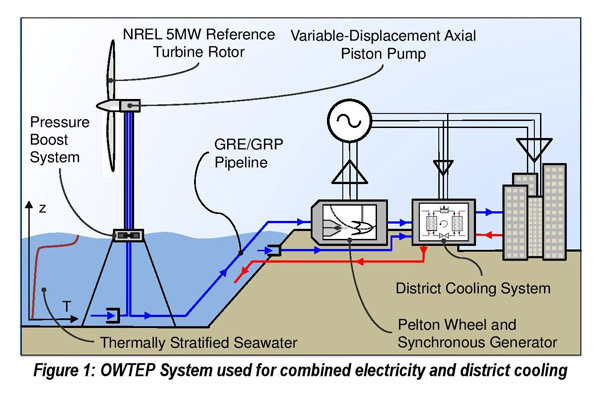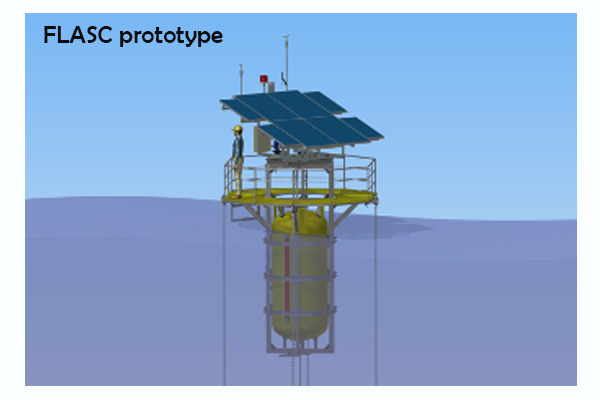
Off-shore technologies are an important, but sometimes neglected area of maritime services. Although Malta is lagging behind in this area, it has been gaining more attention and off-shore related innovations could help Malta keep up with other maritime nations.
Over the past 10 years, the University Department of Mechanical Engineering has invested its efforts to conduct research in the field of offshore renewable energy technologies. Given its strategic location in the Mediterranean Seas, the development of such technologies are expected to offer Malta many opportunities to harvest renewable energy in its territorial waters and to generate new green jobs. The Department has spearheaded research in a novel concept involving the use of floating wind turbines to concurrently exploit wind power with the cold water stored naturally below thermocline formations to supply both electricity and cooling.
The concept, being referred to as Offshore Wind and Thermocline Energy Production (OWTEP), is based on the application of wind turbines pumping cold deep sea-water across a pipeline under pressure to a land-based plant consisting of a hydro-electric plant and heat exchanger, enabling the combined generation of electricity and use of the deep sea water as a superior heat sink for district cooling. (Figure 1)
The development of cost-effective energy storage technologies is today being considered essential to be able to allow the large-scale integration of renewable energy plants into the national grids. Storage allows for mitigating supply-demand mismatch, which is inherent to practically all forms of renewable energy technologies. A number of storage technologies exist, each providing distinct advantages along with their own limitations. One of the key problems is scaling up storage systems to interface with multi-megawatt generation systems. Conventional technologies such as battery banks are not feasible at this scale.

Over the past two years, research into the OWTEP concept has been taken to a next level involving the integration of offshore-based energy storage. Our studies have indicated the importance of energy storage in exploiting the benefits of OWTEP technology economically. A novel concept for large-scale offshore renewable energy storage is currently being developed at the University, through the doctoral research of Ing. Daniel Buhagiar, a full-time PhD student within the Department of Mechanical Engineering.
It is based on hydro-pneumatic accumulator technology that ensures lower cost and a long service life. The system integrates a floating structure, allowing it to be deployed in deep sea. Apart from energy storage, the system may be also used as a multi-purpose floating island to support a number of sea-based activities including renewable energy generation (solar and wind); provision of maritime services for the oil, gas and aquaculture industries and tourist/leisure activities.

The novelty of this project is embodied by the synergistic approach taken in developing a hydro-pneumatic energy storage system that operates at near-constant pressure while simultaneously providing a stable floating island platform. Constant pressure energy storage is highly desirable because it can be easily interfaced with system components and is simple to operate. This is analogous to a battery that provides a practically fixed voltage, irrelevant of the state-of-charge.
One distinct advantage is the use of deep seawater as the working fluid in the hydro-pneumatic circuit. This will be extracted from deep-sea regions below the thermocline layer and thus maintain a stable cool temperature all year round. The system can therefore also act as a form of thermal energy storage for cooling applications.
A promising application is in the liquefaction of natural gas, where offshore platforms are typically required in conjunction with substantial cooling energy.
Afloating storage facility adjacent to a natural gas liquification plant could benefit from the proposed concept, which would provide stabilising upthrust for the floating storage facility, cold seawater for the liquefaction process and electrical energy storage for the required power plant.
The funds sourced from RIDT cover the expenses associated with the laboratory experiments on a model prototype to validate the developed computer models against experimental data under controlled
conditions, which is the second phase of the project.
This phase will offeroffers the possibility to carry out certain tests in the wave tank available in the Fluids Lab of the Faculty of Engineering. It will provide the necessary ground work for conducting much more complex experiments on a much larger system to deployed in a real operating environment (i.e. at sea) during the third phase.
Read more about the project here





